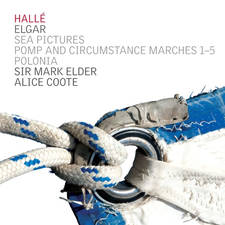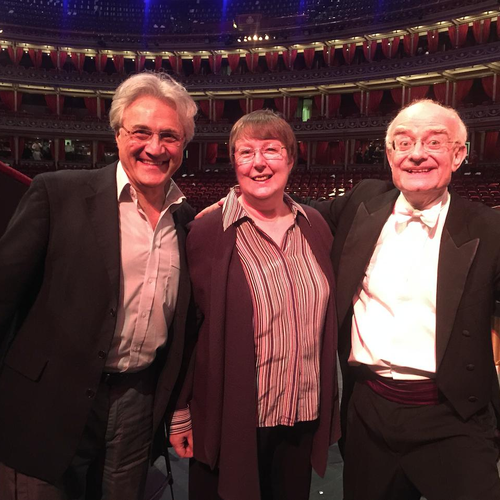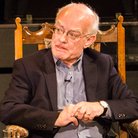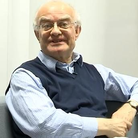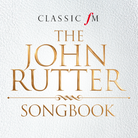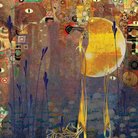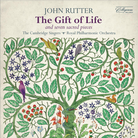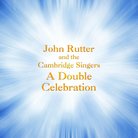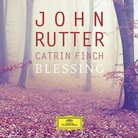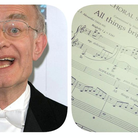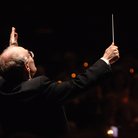John Rutter on ClassicFM.com
6 December 2012, 16:48 | Updated: 12 December 2012, 17:29
Christmas carols, favourite pieces, choral music, and conquering the states: the reigning king of festive music, John Rutter answered your choral conundrums online with Tim Lihoreau.
If you've ever performed in a choir, there's a high chance you've encountered some of John Rutter's well-known choral music, be it an anthem like Gaelic Blessing or The Lord Bless You and Keep You, or an arrangement of a well-loved Christmas carol. Tim Lihoreau got into the festive spirit and posed your choral conundrums to the composer.
Tim Lihoreau: Good Morning, John. It's very kind of you to spare us some of your time - and close to Christmas, too. Which sort of leads me nicely on to my first question: Presumably, this is a busy time for you, isn't it?
Always a busy time for musicians around now, yes - but I don't think we'd have it any other way. Lots of concerts, not much time for Christmas shopping. Haven't written my Christmas cards yet.
Tim Lihoreau: I'm shocked about the Christmas cards! Is there a big focal point for you, concert-wise? The Albert Hall event has passed, now, hasn't it?
Yes - two happy concerts with a huge crowd of people, and the unique thing about it was that they all sing along in the big Christmas hymns, which is inspiring when you've got the Royal Philharmonic Orchestra and the Bach Choir, with the mighty Albert Hall organ. Nothing quite like it. I'm looking forward to next year's already.
Tim Lihoreau: John, I wondered if I could ask you about your approach to composing. Some composers tell us it is a case of... simply sit down and work at it: a little every day, etc. Others tell us it is...the muse, as it were and... if she's not there, composing doesn't happen. How is it for you: do there have to be special circumstances or places?
Like most professional writers - words or music writers - I try to have a routine. When I'm working on a composition I go off to a little secret cottage I've got, deep in the countryside where no one knows the phone number and there's no internet. I work regular hours there, and I start with empty sheets of manuscript paper and carry on till they're full. I often get the clue for what I want to do before I go off and do it, however - maybe I'll be inspired by some words I find in a poetry book, maybe (if I'm writing for King's College Choir, say) it will be the building and the particular performers that get me going. But you can't afford to wait around till you feel like composing, or you might wait for ever.
Parsons Books & Music: You've made some fantastic recordings with your Cambridge Singers. I particularly love your Compline recording from about 2008 - do you have a favourite or special one?
Thanks for remembering the Compline one. We recorded that in the Lady Chapel of Ely Cathedral, which is just about the most inspiring venue for singing choral music anywhere. Full of medieval atmosphere with wonderful reverberant acoustics. I don't specially have a favourite recording, but it was nice to win an award with the Fauré Requiem one, all those years ago.
Rian Chapman: I'm writing from all the way in Australia where it's 40 degrees celcius today! What inspires you when you compose?
Generally the looming deadline...
Tim Lihoreau: John, a quick question...are you still doing the 'John Rutter' days, for choirs? Are they important to you?
Yes, I do about ten or twelve Come-and-Sing days each year, anywhere I get invited to do them. The problem is that everyone wants them on a Saturday, and I have only a limited number of Saturdays available! But they are an important part of my life, because I want to bring the joy of singing to everyone, not just to skilled and trained singers. The reward I get when people say at the end of the day, "Gosh, I DID enjoy that" is huge.
Tim Lihoreau: Do you ever use them as 'testing grounds' for new works? And when is the next one? (our choir have been on two, now, and love them!)
Well no, I wouldn't want to treat all those lovely singers as guinea pigs. In any case, composers hear a perfect performance in their heads when they write, so I don't feel I need to test pieces out. My 2013 Come-and-Sing days will be posted on my website - there might be one in your area, who knows.
Tim Rogers: Hi John, when it comes to Christmas carols, do you prefer composing original pieces or making new arrangements of traditional tunes?
I prefer writing original pieces, but of course I've done a fair number of arrangements of traditional carols over the years, generally for practical reasons of needing to fit the available resources on a particular occasion. At the Albert Hall last week I admit I did enjoy arranging a brief snatch of All I Want for Christmas is my Two Front Teeth (don't ask) for xylophone, anvil and tuba.
Tim Rogers: Of your original carols, which one do you regard as the best and why?
Always the one I haven't written yet.
Tim Lihoreau: And a little question from the La Nova Singers on Twitter: "I'd like to ask, how does he manage to visit all those houses in one night? Oh wait, no, that's the *other* Mr Christmas..." Hehe.
I'm quick down the chimneys.
Tim Lihoreau: Here's something I have ALWAYS wanted to ask you. As every good biography will tell us, you were at school with fellow composer John Tavener. Were you both composing at school? And, of course, any school secrets gratefully received!
John Tavener was composing more prolifically than I was, and on a more ambitious scale. He used to recruit us, his fellow students, to sing and play in his latest epic masterpieces. Those were happy days, and I think we all knew he would go on to fame and fortune (the knighthood was no surprise either). We had the same composition teacher, who did us the great favour of not telling us what an insecure and chancy profession composition was, so we didn't worry about going in for it. I was a slower starter than John. No secrets to give away (I never even smoked behind the bike sheds).
Tim Lihoreau: Your music is VERY popular in the United States. Do you still get time to go over there, these days? And do you notice differences in approach from the two sides of the pond?
I conduct there quite a bit still - and America is where I met my wife, so it has a special place in my heart. I've never really pinpointed any great differences in musical approach… restaurants serve you bigger portions of food though, which isn't good for my spreading waistline. I have had wonderful performers and audiences there, and am grateful for all the opportunities America has offered me and for the welcome I receive there.
Angie Letteboer: When you are composing orchestral accompanying pieces do have a chart of what instruments can do what?
In my head, learned at my mother's knee.
Angie Letteboer: And when you are writing for voices do you sometimes take pity on the altos for instance and lower the harmony even though the effect is not as good?
I married an alto so am very sympathetic to them. Sometimes they don't get the most exciting parts, it's true.
Johnny Nutseed: I noticed you have the same name as me! Haha! Also, I read that you love Christmas which is really fantastic at this time of the year. As the Nutcracker can be seen as a Christmas production and as my surname has the word 'nut' in it, I have to ask you the obvious question... What is your favourite nut?
Brazil, if I want to travel.
Tim Lihoreau: John, many thanks for your time. Playing your music LOTS over the Christmas period. One final question: What is your favourite carol amongst your own works? For me, it is probably the Candlelight, both on the music and words front.
Glad the Candlelight Carol hits the spot for you. I have to work hard on words, if I'm writing the words as well as the music, and I remember being pleased that they seemed to come right in that carol, fitting the mood of the music. But having favourites among your own pieces is like having a favourite child - not a good idea.
Don't forget, there's another web chat next Wednesday at 9am, with Downton Abbey composer John Lunn.
